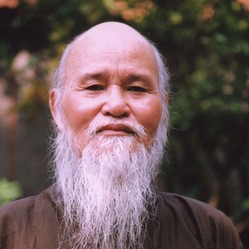Thich Quang Do
Thích Quảng Độ
Current Status: Deceased

Date of Birth: 1928
Gender: M
Religion: Buddhist
Ethnicity: Kinh
Activist Focus:
- Democracy
- Human rights
- Religious freedom
Organizational/Political Party Affiliation:
Details
February 2020:
The Venerable Thich Quang Do passed away on February 20, 2020. Thich Quang Do is one of the last leaders of the An Quang Temple, or The Unified Buddhist Church of Vietnam (different from The Buddhist Sangha of Vietnam), the religious association established during the existence of the Republic of Vietnam during the Vietnam War. The Unified Buddhist Church in general, and the Venerable Thich Quang Do in particular, have faced serious harassment and human rights violations after the reunification of the country. He was imprisoned in re-education camps and the regime's rehabilitation centers for over ten years and was put under house arrest starting in 2003. Thich Quang Do was nominated for the Nobel Peace Prize and received many other human rights honors.
BackgroundVenerable Thích Quảng Độ is the Patriarch of the banned Unified Buddhist Church of Viet Nam (UBCV). He was born in Thai Binh province and currently resides in Ho Chi Minh City. He has been the Patriarch of the UBCV since 2008.
History of ActivismHe is a leading advocate of religious freedom, human rights and democracy. In his various capacities within the UBCV leadership, he has steadfastly refused to join the government-created Buddhist Church. He has been alternatively imprisoned, internally exiled, or under house arrest since 1977. He was awarded the Thorolf Rafto Memorial Prize, the Homo Homini Award (2002), and other prestigious human rights prizes.
October, 2003: arrest
Until October 2018, he had been confined to the Thanh Minh Zen monastery in Hồ Chí Minh City since October 2003, when security officials told him that he had been placed in administrative detention for an indefinite period.
October 2018:
The 90 year-old Venerable Thich Quang Do, the Patriarch of the banned Unified Buddhist Church of Viet Nam (UBCV), was been forced to leave the monastery where he had been confined to house arrest since October 2003. A superior monk, Thích Thanh Minh, initiated the exit, saying that Thich Quang Do had brought problems upon the monastery, likely referring to his human rights, democracy, and religious freedom advocacy. According to Radio Free Asia, "The Vietnamese government, which does not recognize the church, had been trying to move Thich Quang Do out of the monastery for the past two years, and he vowed to stay unless asked to leave by the superior monk himself." After leaving on September 15, he did not have a stable residence and moved back to his home province, the remote Thai Binh. Despite this setback, he vowed to continue his work.
November 2018:
After being expelled from the Thanh Minh Zen Monastery for two months, Patriarch Thich Quang Do finally returned to Ho Chi Minh City on November 22. He went to Tu Hieu Pagoda, Ho Chi Minh City. He revealed that he was put under house arrest by his own nephew, a former Security Police Officer, during his time back in his birthplace in the remote Thai Binh Province. Thanks to efforts from the Unified Buddhist Church of Vietnam, as well as The International Buddhist Information Bureau, he arrived at Tu Hieu pagoda safely despite surveillance from security forces.
November 2018:
After being expelled from the Thanh Minh Zen Monastery for two months, Patriarch Thich Quang Do finally returned to Ho Chi Minh City on November 22. At the time of writing, he was at Tu Hieu Pagoda, Ho Chi Minh City. He revealed that he was put under house arrest by his own nephew, a former Security Police Officer, during his time back in his birthplace in the remote Thai Binh Province. In September, he was forced to leave the monastery where he had been confined to house arrest since October 2003. A superior monk, Thích Thanh Minh, initiated the exit, saying that Thich Quang Do had brought problems upon the monastery, likely referring to his human rights, democracy, and religious freedom advocacy. Thanks to efforts from the Unified Buddhist Church of Vietnam, as well as The International Buddhist Information Bureau, he arrived at Tu Hieu pagoda safely despite surveillance from security forces. The United States Commission on International Religious Freedom Vice Chair Kristina Arriaga said of the pressure of authorities on Thich Quang Do to relocate him to Thai Binh: "I urge the government of Vietnam to respect his freedom of movement and freedom to reside wherever he chooses.”
Actions TakenJuly 2012:
Three UN Special Rapporteurs sent a letter to Vietnamese authorities asking for information about alleged retaliation against members of the Unified Buddhist Church of Vietnam, including Thich Quang Do, after they engaged in peaceful protests for maritime sovereignty. They asked for "the legal basis of the aforementioned restrictions on freedoms of peaceful assembly, opinion and expression and association" and for explanation as to "how these measures are compatible with international human rights norms and standards."
February 2014:
Thich Quang Do gave recorded testimony at a Geneva event about the human rights situation in Vietnam. He spoke of his own imprisonment, stating: "What is my ‘crime’? That of calling on Vietnam to respect its people’s rights to freedom of expression, association, peaceful assembly, religion and belief."
February 2017:
Amnesty International launched a letter-writing campaign to bring awareness to Thich Quang Do's plight, calling on members of the European Parliament to press for his release during a February 2017 visit to Vietnam.
March 2018:
UBCV leader Thích Quảng Độ returns safely to Saigon, Queme, November 28, 2018
USCIRF Statement on New Restrictions by Vietnamese Government on Religious Leader Patriarch Thích Quảng Độ, USCIRF, November 28, 2018
Profile last updated: 2024-06-13 20:34:04

